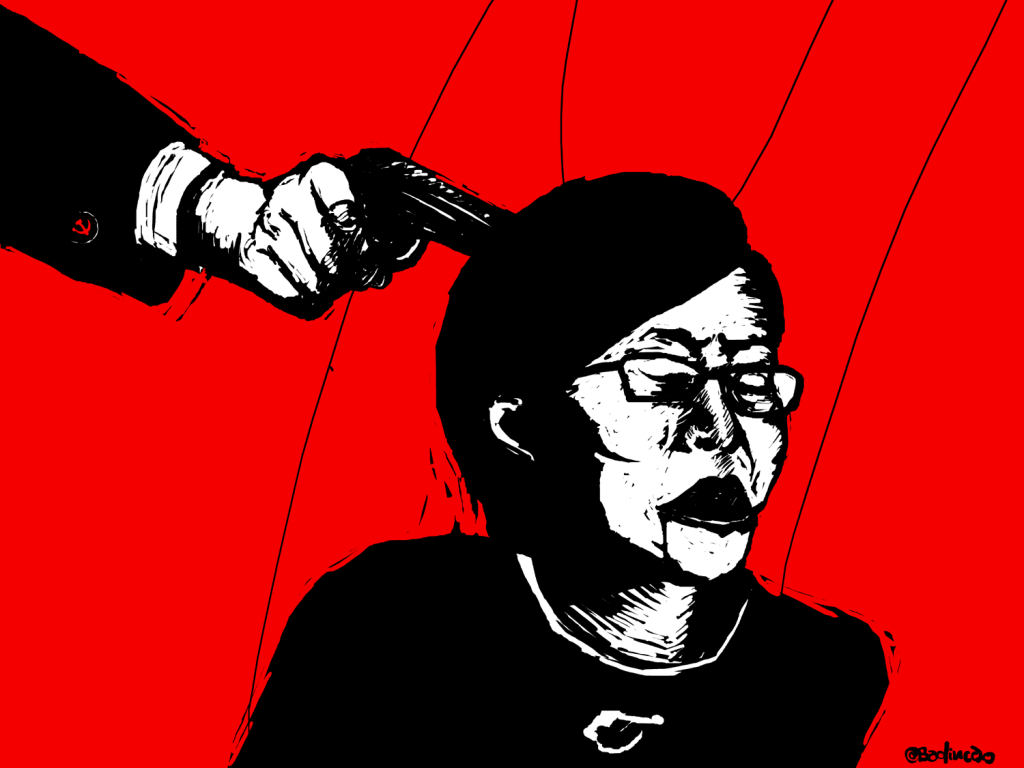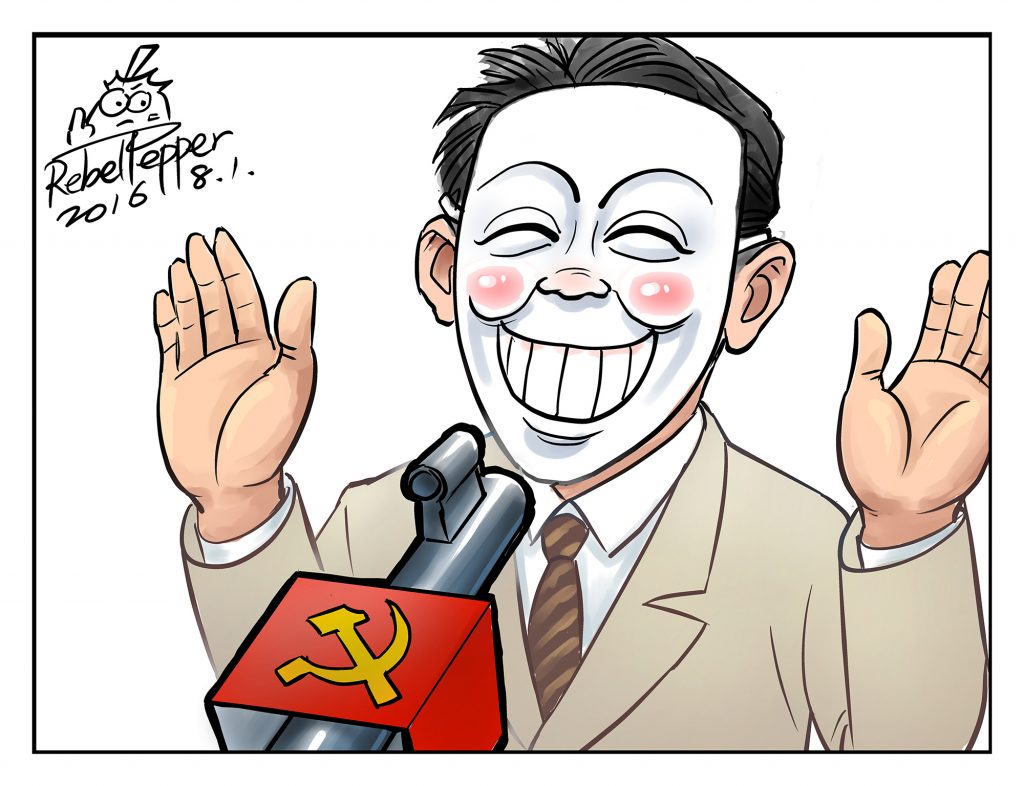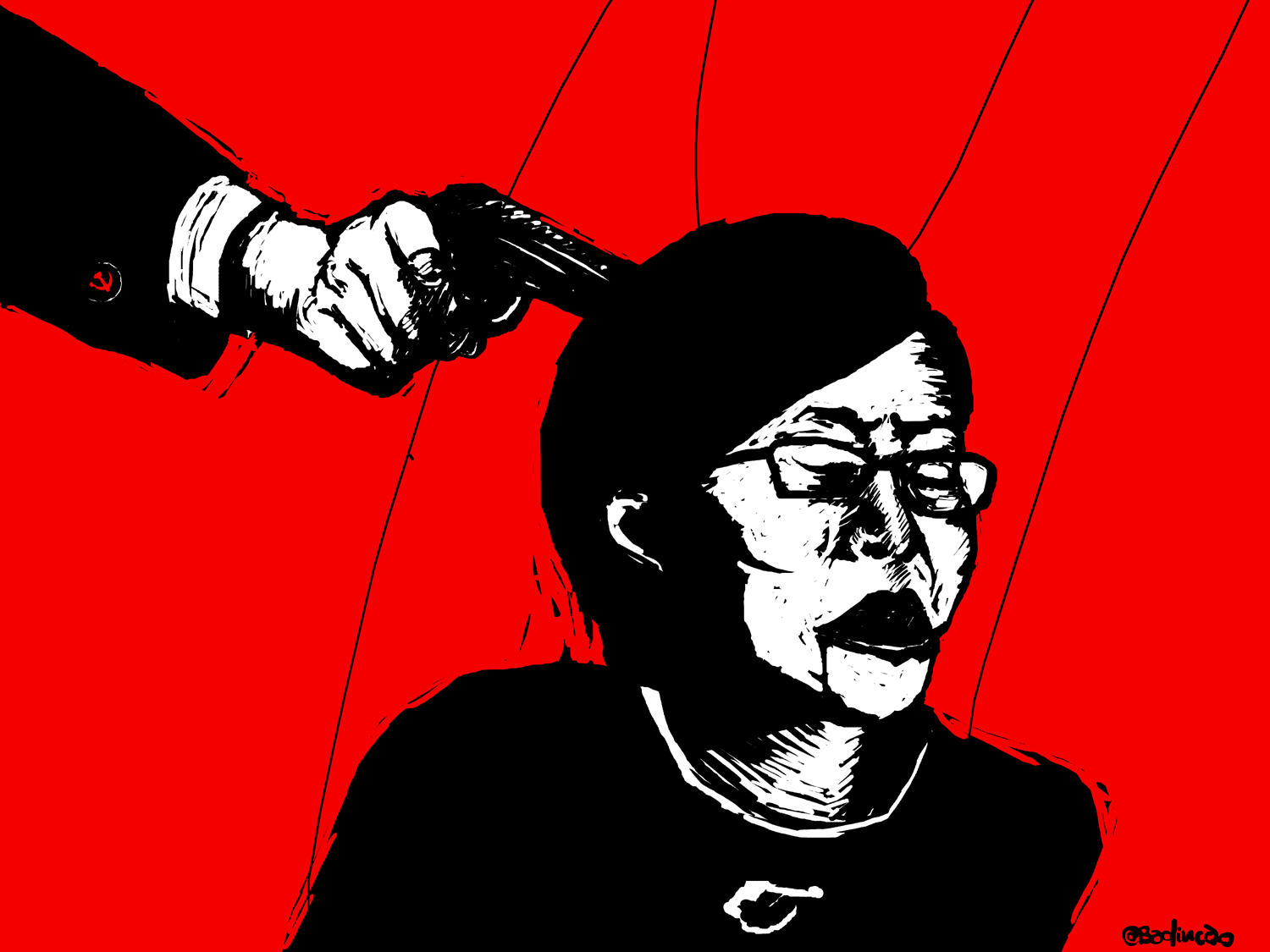This week, rights lawyer Wang Yu was reportedly released after Hong Kong-based media aired a confession-style interview with her. Wang’s interview is the latest in a series of publicized confessions by lawyers and activists who were detained as part of the “Black Friday” sweep launched on July 9, 2015, and the second to be issued by way of Hong Kong media.
For CDT, cartoonist Badiucao (巴丢草) portrays Wang Yu’s confession as one made at gunpoint, under control of a Party puppet master:

“Won’t Acknowledge, Won’t Recognize, Won’t Accept,” by Badiucao (巴丢草) for CDT.
In Badiucao’s illustration, an arm adorned with a hammer and sickle holds a gun to Wang’s head. She is a reluctant marionette, eyes closed as she waits for her strings to be pulled.
Wang has yet to be seen publicly since her announced release, and the China Human Rights Lawyers Concern Group—and others—have expressed doubts that she is genuinely free or that her confession was made of her own accord.
In her interview, Wang used language reminiscent of state media blaming “foreign forces” for training Chinese activists to “attack” the Chinese government, and including a castigation of her colleague Zhou Shifeng. Wang Yu told the Oriental Daily that she “won’t acknowledge, won’t recognize, and won’t accept” foreign human rights awards, claiming, “I am Chinese. I only accept the leadership of the Chinese government. I don’t accept the award now and won’t accept it in the future,” one of many parts of her confession that echoed official language. (The phrasing “won’t acknowledge, won’t recognize, and won’t accept” was recently seen in Beijing’s official condemnation of an international tribunal’s ruling against China’s claims in the South China Sea.) Wang has recently been selected for both the Ludovic Trarieux Human Rights Prize and the American Bar Association’s inaugural International Human Rights Award. Psychologist Tang Yinghong alludes to Wang’s plight in a recent WeChat post in which he discusses Soviet writer Boris Pasternak’s acceptance, then refusal, of the 1958 Nobel Prize in Literature.
The release of legal assistant Zhao Wei last month was made under similar circumstances; her “confession” was relayed in an interview with the South China Morning Post, and her whereabouts since her release are still unknown. Several other lawyers and activists detained in the “Black Friday” crackdown are going on trial this week. Political cartoonist Rebel Pepper (变态辣椒) interprets the highly-publicized confessions of human rights lawyers and activists as a violent farce:

By Rebel Pepper (变态辣椒)
A smartly dressed man, perhaps a lawyer, wears the mask of comedy and holds up his arms in front of a rifle disguised as a reporter’s microphone. Rebel Pepper, who has been living in exile in Japan for two years, says this about his drawing:
After the CCP released Zhao Wei, she posted a few controversial Weibo posts before going silent. No one knows her whereabouts. Wang Yu’s bail is quite similar to what befell Zhao Wei. She gave an interview to restricted media, condemning foreign forces for using her. She even criticized foreign forces for taking her son hostage. Many have been baffled by this inversion of the truth. But the microphone before her was really the barrel of the CCP’s gun. When coerced, people will say a lot of things that go against their true feelings. It’s hard for me to imagine being in prison for over a year, the changes that a person goes through under harsh conditions. This was my original intention for this comic. More people will be forced to confess on camera after Wang Yu. As long as the CCP’s rule continues, such public spectacles and humiliation will never stop.
赵威被中共释放后发了几条引发极大争议的微博后又销声匿迹了,没有人知道她的下落。这次王宇律师被取保候审,和赵威的遭遇非常相似,接受限定的媒体采访,谴责境外势力对她的利用,甚至指责是境外势力绑架了她的儿子作为人质,这样的颠倒黑白会让很多人困惑,然而采访她的麦克风也正是中共的枪口,人在被胁迫的情况下会说出很多违背本意的话,我也很难想象被囚禁的一年多时间,残酷的环境会让人发生什么样的变化,这是创作这张漫画的初衷,王宇之后还会有更多人被迫在媒体上认罪,只要中共的统治继续存在,这样的公开示众和羞辱不会停止。
Both Rebel Pepper’s and Badiucao’s cartoons show sympathy for the confessor, and express the belief that the words in their confessions are not really their own.
Artist Ai Weiwei satirized Wang’s confession through a series of Instagram videos in which he or others mocked the words she used. Chantal Yuen reports for Hong Kong Free Press:
Ai Weiwei’s “burst out laughing” at the motherland also provoked several parodies. His imitators face the camera, like Ai, declare that they have decided to forget their pasts and “burst out laughing” at their motherland. This is a play on a phrase that Wang Yu used. In her interview, she said that she wants her son to “serve the country.” The Chinese word for “to serve” sounds exactly the same as the word for “to burst out laughing.” [Source]
On his blog, legal scholar Jerome Cohen comments on the public confessions, and how the “confessors” may be coerced into making statements that they do not believe:
It’s obviously too soon to analyze with confidence but it sounds like another of the curious deals that are being struck between PRC oppressors and courageous but hapless human rights victims, deals involving the welfare of spouses, children, parents, lovers etc as well as the target whose captivity and torture are at stake.
This is all so sad, not only for the oppressed, broken victims but also for China and its standing in the world. These pathetic, ludicrous “confessions” and charges are obviously designed for a Chinese audience, but tens of millions of Chinese are not foolish enough to believe these farces.
Yet the damage to China that these torture-inspired fairy tales inflict abroad is incalculable. Does the Chinese leadership not see this? Xi Jinping is holding himself and the country up to increasing worldwide ridicule. This is the Chinese Communist Party’s distinctive contribution to the playbook of international Communist abuse of the legal system and promises to rank in notoriety with Stalin’s infamous purge trials, although so far no Chinese victims have been formally executed! [Source]
Anne Henochowicz contributed to this post.








